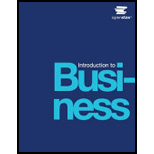
Concept explainers
The Honest Company is a consumer-goods business that sells nontoxic, eco-friendly items for baby and personal care, household cleaning, and a healthy lifestyle. Cofounded by actress Jessica Alba a little more than six years ago, Honest Co. is built on the promise of "telling all and doing our best to live up to your expectations."
Over the years the company has received high praise and media buzz about its ethical approach to making products that are not only good for people but good for the environment. On its website, Honest Co. goes to great lengths to share with consumers its guiding principles that products are made without harming people or the planet.
A little over two years ago, however, the company experienced some bad press when The Wall Street Journal reported that two independent lab tests found samples of Honest laundry detergent contained a cleaning agent on the list of chemicals the company pledged to avoid. At first, pushback from company officials was loud and clear: they denied their products were anything but eco-friendly and safe for consumers and went as far as calling the report "false" and "junk science."
Unfortunately, the reports about Honest products and their harmful ingredients didn't go away. After the laundry detergent story faded, the company quietly reconfigured the ingredients that went into the detergent as well as other products. But that wasn't the end of the story. Several months later, Honest Co. voluntarily recalled organic baby powder that might cause infections and more recently recalled diaper wipes that appeared discolored.
Despite these recent challenges, Honest Co. continues to be successful and was rumored to be on the short list of possible acquisitions for global conglomerates such as Procter & Gamble, Johnson & Johnson, and Unilever. These consumer-good giants are snapping up smaller, eco-friendly firms that have blossomed into full-fledged ethically and environmentally conscious organizations with strong sales and solid reputations among consumers. Recently, however, Unilever acquired one of Honest Co,'s biggest rivals, Seventh Generation, Inc., leaving Honest Co. to again rethink its business strategies, including hiring a new CEO.
Using a web search tool, locate information about this topic and then write responses to the following questions. Be sure support your arguments and cite your sources.
Ethical Dilemma: Do you think the company's reaction to reports of hazardous ingredients hurt its reputation for honesty and ethical behavior? Do you think the company's missteps caused Unilever to shy away from acquiring the company? Or, do you take the stance that Alba's entertainment background played a part in the press going after the company? If you were an advisor to the new CEO, what suggestions would you give him for getting the company back on track, especially when it comes to corporate social responsibility?
To explain:
Whether the reaction of the H Company can hurt the reputation for honesty and ethical behavior and whether the wrong steps taken by the company can be a reason that Company U did not acquired H Company. List some suggestions that can be given to the company.
Introduction:
Cooperatesocial responsibility is an organization's responsibility to give some value back to the society and the environment in which it operates. The understanding is that organizations operate in an open environment where it takes its inputs from and sends its outputs back to. Therefore, it is the responsibility to take care of that environment if an organization wants to survive in the long run.
Explanation of Solution
It is clear that H did not actively do anything against the news report about the company's products other than denying it. This would infer that the company was involved in using chemicals that were harmful. The action should have been where the company would actively prove that all its ingredients are ecofriendly and sourced properly.
It is likely that this news and the negative publicity around H had an impact on Company U for not making an offer to the company. Since one of the main reasons, that any multinational would be interested in H Company would be for its ecofriendly line; an accusation hanging against them would be a reason for any buyer to walk away.
Since the story behind the chemicals used for the detergent has now blown away there is no point in pursuing in that direction. Rather it must reiterate to its customers that H's products are completely safe and ecofriendly. Using the triple bottom line of people, planet and profits H Company can initiate a new CSR strategy that would highlight how the products are safe for the planet, people who use them and how it is cheap and affordable.
Want to see more full solutions like this?
Chapter 2 Solutions
Introduction to Business
Additional Business Textbook Solutions
Horngren's Cost Accounting: A Managerial Emphasis (16th Edition)
Corporate Finance (4th Edition) (Pearson Series in Finance) - Standalone book
MARKETING:REAL PEOPLE,REAL CHOICES
Engineering Economy (17th Edition)
Horngren's Financial & Managerial Accounting, The Financial Chapters (Book & Access Card)
Horngren's Accounting (12th Edition)
- Hi expert provide correct answer general accountingarrow_forwardMaple manufacturing has provided its contribution solve this accounting questionsarrow_forward“Implementing a Performance Management Communication Plan at Accounting, Inc.” Evaluate Accounting Inc.’s communication plan. Specifically, does it answer all of the questions that a good communication plan should answer? Which questions are left unanswered? How would you provide answers to the unanswered questions? “Implementing an Appeals Process at Accounting, Inc.” If you were to design an appeals process to handle these complaints well, what would be the appeal process? Describe the recommended process and why.arrow_forward
